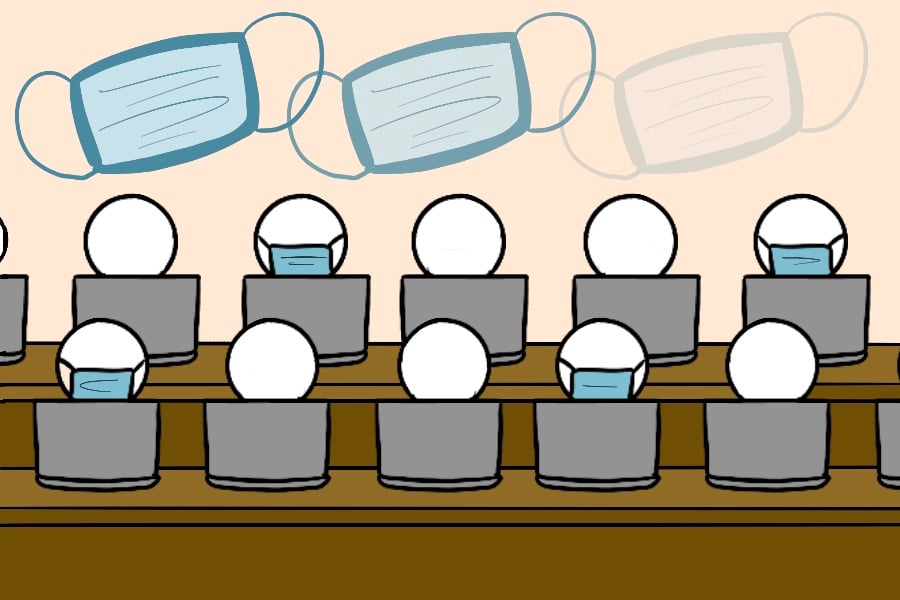Faculty members, teacher’s assistants express concerns about lifted mask mandate in classrooms
Northwestern lifted its mask mandate in classroom spaces on Tuesday.
March 30, 2022
On Tuesday, students and faculty were able to walk into in-person classes maskless for the first time in more than two years — but some faculty members and teacher’s assistants are concerned the new policy may further spread COVID-19 and place their families at risk.
Though Northwestern instituted a mask-optional policy across most on-campus spaces on Feb. 28, community members were required to mask in classroom spaces starting the first day of Spring Quarter. The University still “strongly recommends” masking in spaces where distancing is not possible.
Art Theory and Practice Prof. Pamela Bannos said she is conflicted regarding the decision to lift the classroom mask mandate. The decision reflects Illinois state policy, which ended the indoor mask mandate on Feb. 28, but Bannos said she still has reservations on how the decision could impact her family.
“I am still my 92-year-old mother’s caregiver, so my goals include protecting her from this virus,” Bannos said.
This quarter, Bannos will be teaching three courses, including Art Theory and Practice 250 in the darkroom in Kresge Hall. She said the darkroom has very little space for social distancing, so she will ask her students to wear masks during sessions.
Though she will be wearing a mask this quarter to protect herself, Bannos said she is concerned the lack of a mandate will result in higher COVID-19 spread in classrooms.
“I’m concerned about students getting COVID during the quarter and going into quarantine and missing class because their masks are off during my class in particular, where there’s no distancing,” Bannos said.
Richard Zinbarg, chair of the Department of Psychology, is not completely against the policy, but said he is worried how it may affect vulnerable members of the Evanston community.
“If we lose one NU student or faculty member or family member of an NU person because of COVID and the spread of it that we could have prevented, that’s already a tragedy and too much loss of life,” Zinbarg said.
Zinbarg said although the policy allows immunocompromised professors to request a mask mandate in individual classes through the Office of Equity, he is unsure whether that option extends to immunocompromised students.
The current policy states instructors can only require masking if they are “directed to do so as part of an approved disability accommodation through the Office of Equity or Accessible NU,” but does not clarify whether students can make similar requests.
Zinbarg added he has heard concerns from faculty in his department who are worried the lack of a classroom mask mandate could affect their families.
“I heard from faculty who have children under the age of five and so their kids are not vaccinated,” Zinbarg said. “Not only that, some of their kids go to preschool where their kids come into contact with people who are immune-compromised.”
Currently, the Food and Drug Administration has not approved a COVID-19 vaccine for individuals under the age of five.
Zinbarg hopes immunocompromised students and faculty with children under the age of five will have more options to ensure their and others’ safety in classrooms.
Second-year Ph.D. student in religious studies Ray Buckner said he is worried more students will contract COVID-19 as a result of the mask mandate being lifted. During Winter Quarter, as a TA for Religious Studies 210, Buckner said he would have students absent each week due to the virus.
“(The policy) is going to create more sickness and more health issues that we know can be extremely serious with COVID, whether it’s a mild case or not,” Buckner said. “We also know this is going to overwhelmingly affect immunocompromised students and faculty and staff.”
Buckner said he thinks the school’s new masking policy does not protect NU’s most marginalized individuals and forces them to advocate for themselves.
This quarter, Buckner will be a TA for Religious Studies 265. He said he will “deeply encourage” his students to wear masks in discussion sessions.
Although second-year Slavic Languages and Literatures graduate student Elena Poiata is not a TA this quarter, she still has doubts regarding NU’s new mask policy.
“I think it is a little bit ableist because we are essentially putting vulnerable populations at greater risk,” Poiata said.
Another concern among some faculty is the ever-changing nature of the pandemic. Art Theory and Practice Prof. Allison Wade has “mixed feelings” regarding the school’s decision on the classroom mask mandate due to the potential for new COVID-19 variants.
“Things are good right now, but there’s the possibility of things becoming more contagious over here,” Wade said. “It just feels like it’s hard to predict what will happen.”
Email: [email protected]
Twitter: @PavanAcharya02
Related Stories:
— Northwestern to lift mask mandate in classrooms at start of Spring Quarter
— NU professors and students transition to in-person learning
— Students express mixed opinions on removal of mask mandate












